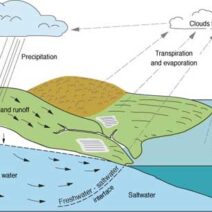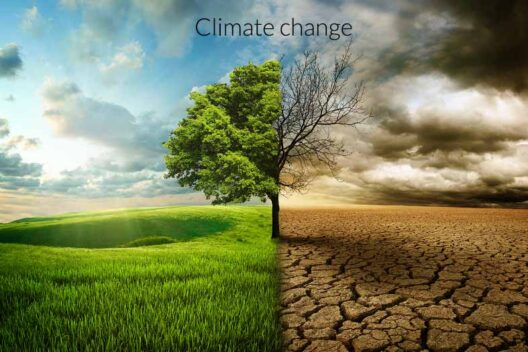The phenomenon of climate change has catalyzed a profound shift in global consciousness regarding environmental issues. It is no longer a distant threat, but a reality that has been interwoven into the fabric of daily life. The very essence of climate change revolves around the increase in global temperatures, which has far-reaching effects on our ecosystems, economies, and societies. The insatiable curiosity surrounding climate change is often fueled by a need to comprehend its mechanisms, consequences, and potential solutions. Consequently, understanding the true impact of climate change illuminates the multifaceted ways it reshapes our world.
To scrutinize the impact of climate change, one must begin with an exploration of the data that illustrates the alarming trajectory of global temperatures. For the past 24,000 years, scientific records reveal a steady pattern in climate fluctuations. However, the current phase of abrupt warming is unprecedented. This rapid increase in temperature is primarily attributed to anthropogenic activity, particularly the combustion of fossil fuels, deforestation, and industrial processes that elevate greenhouse gas concentrations in the atmosphere. The ramifications of these temperature shifts manifest in diverse forms, revealing their pervasiveness across different environmental spheres.
The implications for biodiversity are colossal. Species extinction rates are accelerating at an alarming pace, as habitats are rendered inhospitable. The World Wildlife Fund has reported that nearly one million species face extinction, many within decades, due to climate change. Ecosystems such as coral reefs, which are particularly sensitive to temperature fluctuations, exhibit widespread bleaching and decline as ocean temperatures rise. Such loss does not merely represent the disappearance of species; it implies a detrimental impact on the intricate web of life that supports human existence. The degradation of biodiversity undermines the natural services that ecosystems provide, including pollination, water filtration, and carbon sequestration.
Climate change also has dire consequences for human health. The increasing prevalence of extreme weather events—hurricanes, heatwaves, floods—places populations at risk, leading to injuries, fatalities, and psychological stress. Evidence suggests that climate change exacerbates air quality issues, leading to respiratory ailments and cardiovascular diseases. Furthermore, the spread of vector-borne diseases, such as malaria and dengue fever, is influenced by changing climates. Warmer temperatures expand the habitats suitable for these vectors, thus facilitating the spread of diseases previously confined to specific regions. The connections between climate change and health are intricate, claiming lives directly and indirectly.
Economically, the repercussions of climate change are equally profound. Extreme weather events disrupt food supply chains, causing scarcity and price volatility. Agriculture, a cornerstone of many economies, suffers from altered precipitation patterns and soil degradation. Prolonged droughts diminish crop yields, while increased rainfall can lead to flooding and crop losses. The interconnectedness of global markets further amplifies these challenges, whereby localized climate impacts can reverberate worldwide. Hence, the economic ramifications are not confined within borders; they ripple through markets, affecting food security and livelihoods across nations.
As the climate crisis unfolds, societal dimensions are also transforming. Communities, particularly those in vulnerable regions, find themselves on the frontlines of climate impact. Displacement due to extreme weather events and rising sea levels generates climate refugees; these individuals are often disproportionately affected due to socio-economic disadvantages. The intersection of social justice and environmental degradation highlights that marginalized communities bear the brunt of climate change, raising ethical questions about responsibility and resource allocation. The narratives of these communities amplify the human dimension of climate change, urging a collective reevaluation of our societal structures and policies.
Mitigation and adaptation strategies are crucial in countering the adverse effects of climate change. Global agreements like the Paris Agreement highlight the necessity for collective action to limit global warming to 1.5 degrees Celsius. Innovations in renewable energy sources, energy efficiency, and sustainable agricultural practices emerge as pivotal solutions. Transitioning to a low-carbon economy not only curtails emissions but also fosters job creation in new sectors. However, achieving meaningful progress demands a paradigm shift in how societies value resources and prioritize sustainable practices over short-term gains.
In conjunction with mitigation efforts, adaptation strategies are imperative to help societies cope with the ongoing impacts of climate change. Infrastructure improvements, such as enhancing flood defenses and developing sustainable water management systems, can significantly reduce vulnerability. Additionally, investing in climate-resilient crops and agricultural practices fosters food security in an era of uncertainty. Education and community engagement are equally vital, as informed populations are better equipped to advocate for necessary changes and adapt to evolving realities.
The allure of climate change extends beyond the mere acknowledgment of its threats. It squanders the notion of an untouched paradise, confronting humanity with the uncomfortable truths about its environmental impact. The phenomenon invites a reflection on the interconnectedness of life and a reconsideration of values, pushing society towards sustainability. The quest to comprehend climate change and its myriad consequences is not just an academic pursuit; it symbolizes a collective undertaking to forge a resilient and harmonious coexistence with our planet.
In summary, the true impact of climate change encapsulates a complex interplay of environmental, health, economic, and social factors that collectively underscore the urgency of the issue. With the clock ticking relentlessly on our window to act, the pursuit of knowledge and the mobilization of action are more critical than ever. The ramifications we face are not merely hypothetical but rather a palpable reality that demands our attention, advocacy, and concerted efforts for a sustainable future.



